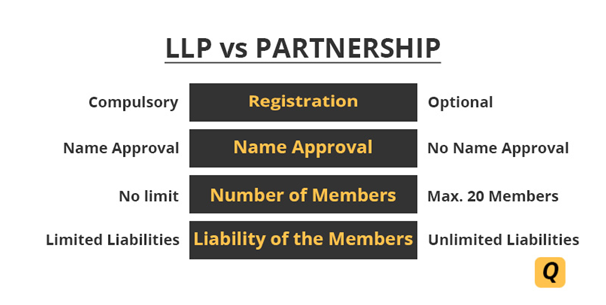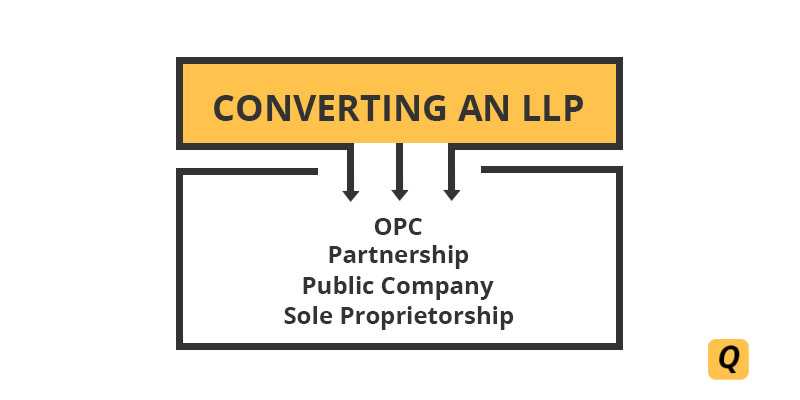Limited Liability Partnership
February 10, 2016 by Tejaswi Kumar Singh
Limited Liability Partnership is the type of Partnership in which all the partners have limited liability and share profit & Losses in the profit sharing ratio. All the partner's liability is limited to their capital contribution under LLP. Similar to partnership firm, LLP also has an LLP agreement which contains the rules and regulation of an LLP.
Introduction of LLP
The introduced LLP structure allows creation of LLPs in a body corporate form i.e. as a separate legal entity, separate from its partners/members.
In short, the Limited Liability Partnership provides formation of a business organisation with limited liability to the owners.
As per the Act, the LLP provides the advantages of both the Company and Partnership and it is the easiest form of business to incorporate and manage.
Nowadays, LLP model is getting more popularity among Startup companies as it is cheaper(lesser Compliance) to run and maintain, it offers limited liability, many tax benefits, credibility and above all, it is registered with the Ministry of Corporate Affairs (MCA).
Features of an LLP
Limited Liability Partnership contains the features of both Partnership firm and Company. Following are the features which represent LLP.
- Unlike Partnership firm, Every partner is independent of other partners negligence and misconduct.
- All partners are only liable up to the amount of the capital contribution in the business.
- Limited Liability Partnership has its own PAN card, All the income generated by an LLP shall be taxable under the name of LLP itself.
- Designated Partners in LLP are similar like directors in a company. Designated Partners holds the power to control over LLP.
Benefits of an LLP
LLP is a unique form of business which started on 9th January 2009. Limited Liability Partnership Act 2009[2] was introduced because it was seen that there were many people who want to do the business but afraid to open a company due to high compliance. In 2009, Lawmaker introduced Limited Liability Partnership because those who are habitual in running a Partnership can grow their business while doing business as LLP. Following is the comprehensive list of LLP benefits
- No Compulsory Audit
- Low Incorporation cost
- Tax Benefits
- Lesser Compliance
- Separate Legal Entity
For more Benefits visit Advantages of LLP

LLP vs Partnership Firm
Partnership Business is a Traditional form business and LLP is modified version of partnership which carries some features from Companies Act 2013[1] as well.
Limited Liability Partnership
- It is registered under the Jurisdiction of Central Government
- In LLP one partner is not liable for the act of the other partner
- All the partners have limited Liability under LLP
- LLP name is registered all over India. No one from any other state can register LLP with the same name
Partnership Firm
- It is registered under the State Government Jurisdiction
- In Partnership Firm all the partners severally and equally liable for the act 1 partner
- In Partnership Firm all the partner face unlimited liability clause
- Partnership Firm name is registered under a State. If anyone wants to incorporate a partnership firm in another state then they can incorporate it with the same name
To know more Visit LLP vs Partnership

Conversion of Business
Conversion of Business is required when any business reaches its saturation point it tends to grow more.
In case of Partnership Firm, it can be converted into any other business types like Partnership Firm can be converted into LLP, Private Limited Company, Public Limited Company, etc.
In the case of LLP, The privilege of conversion is not given in the LLP Act. This is the only flaw of registering an LLP.
Some Miscellaneous Information
Post Compliances – Subjected to the Minimum Turnover Criteria
Limited Liability Partnership (LLP) under the Limited Liability Partnership Act, are required to file the following Forms with the Registrar every year:
|
S. No. |
Document |
e-Form |
|
1 |
Statement of Account & Solvency |
|
|
2 |
Annual Return |
How to do the Filing
LLPs can do e-Filing in following ways:
The Designated partner (DP) (in the case of LLP) or authorized representative (AR) (in the case of Foreign Limited Liability Partnership (FLLP)) can upload the e-Forms on the LLP portal (after registering oneself as a user of the portal) at his convenience from his office/ home. E-filing is the most convenient way of registering an LLP.
Your responsibilities
Limited Liability Partnership (LLP) is taxed @30% flat on the profit earned by the LLP. To know more about the responsibilities of designated partners to save from imposing penalties. Visit Post Incorporation Compliance for LLP.